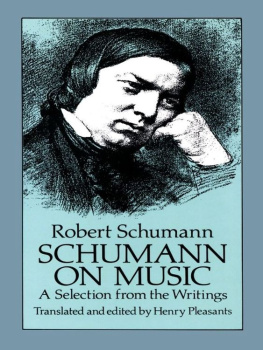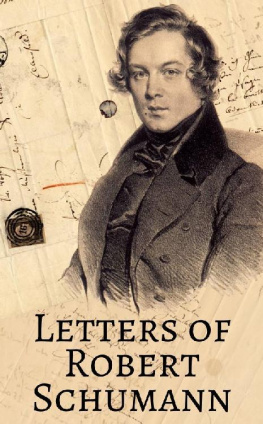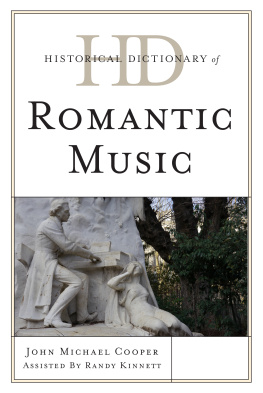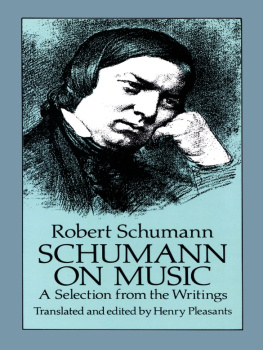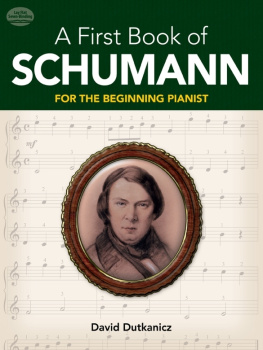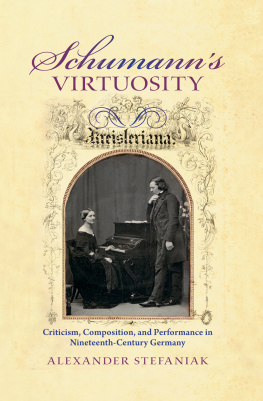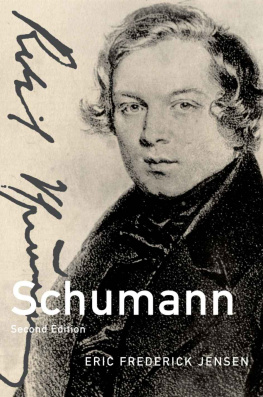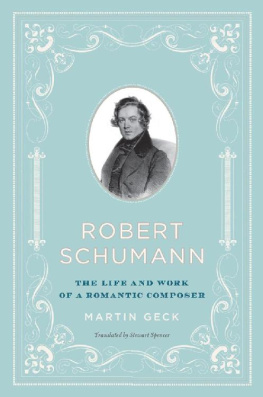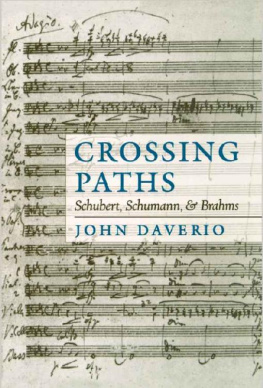Copyright 1965 by Henry Pleasants.
All rights reserved.
This Dover edition, first published in 1988, is a slightly corrected republication of The Musical World of Robert Schumann: A Selection from His Own Writings, originally published by Victor Gollancz Ltd, London, and St. Martins Press, New York, in 1965.
Schumann, Robert, 1810-1856.
[Literary works. English. Selections]
Schumann on music : a selection from the writings / Robert Schumann : translated and edited by Henry Pleasants.
p. cm.
Translation of selections from Gesammelte Schriften ber Musik und Musiker.
Reprint. Originally published: The musical world of Robert Schumann. London : Gollancz, 1965.
Includes index.
1. Music19th centuryHistory and criticism. 2. Musicians. I. Pleasants, Henry. II. Title.
INTRODUCTION
R OBERT SCHUMANN founded the Neue Zeitschrift fr Musik (literally, New Periodical for Music) in 1834 when he was not yet twenty-four. He was its owner, editor and principal critic until 1844 when he turned it over to a colleague and moved to Dresden.
Nearly a decade later, after he and Clara had moved from Dresden to Dsseldorf, and when he was once more suffering from symptoms of the mental disease that would soon cost him his life, he began to assemble and edit the hundreds of essays, articles, reviews, feuilletons, aphorisms, etc., that he had written for the Neue Zeitschrift fr Musik. They were published in 1854 as Gesammelte Schriften ber Musik und Musiker (Collected Writings about Music and Musicians) in two volumes.
There have been two previous attempts to translate Schumann into English. The first was by Fanny Raymond Ritter who, in 1876-1880 brought out Music and Musicians in two instalments designated, respectively, as First and Second Series. Her arrangement of the material was influenced by the fact that the First Series was published with no certainty that a Second Series would follow. For obvious reasons she selected what appeared to her to be the best of the crop for this First Series, including all the major set pieces such as Florestans Shrovetide Oration, the essays on Berlioz Sinfonie Fantastique and Schuberts Symphony in C major, the Letters of a (Music-) Lover, A Monument to Beethoven, The Editors Ball, etc.
In so doing she disregarded the chronological order which Schumann had chosen for his book. Lesser items were grouped according to forms, i.e. under symphonies, overtures, studies for the pianoforte, concertos, etc. This system was continued more consistently in the Second Series. Schumann had also used it, both in the Neue Zeitschrift fr Musik and, chronologically, in his Gesammelte Schriften, but Mrs. Ritter, in abandoning chronology, also abandoned that continuity of history and style which is essential to an appreciation of Schumann as writer and critic.
Her accomplishment in translating the whole two volumes was formidable, but the English is so dated and the error count so high that her work could not be allowed to stand for ever as the English-speaking music lovers only insight into the literary and critical gifts of Robert Schumann. The volumes are, moreover, almost totally devoid of annotation.
A second attempt was made under the sponsorship of the New Friends of Music, of New York, in 1946 with the late Paul Rosenfeld as the translator. It was published in the United States by Pantheon Books Inc. and in England by Dennis Dobson. This time no effort at completeness was made, and again the chronological order was disregarded. Instead, the emphasis was on what Schumann had written about the great masters. All that he wrote on Beethoven, for instance, was assembled under the heading, Beethoven, and all that he wrote about Chopin under Chopin, including fragments culled from articles not solely devoted to the composers concerned. Thus, of The Editors Ball, one of Schumanns most imaginative and literate pieces, we get only an excerpt dealing with Chopin. The English, if hardly exemplary, is an improvement upon Mrs. Ritters, and the error count is low. The annotation is meagre.
In plotting my own attempt I have been prompted by the conviction that a chronological arrangement of the material selected is essential to an understanding of Schumanns progress as a writer and critic and also of the evolution of music in Germany during a decisive decade; further by the thought that Schumanns position as a critic cannot be gauged simply by the glowing words he had for the masters. If there are comparatively few among us today to whom Spohr, Moscheles, Hummel, Thalberg, Hiller, Herz, Field, Kalkbrenner, Cramer, Henselt, Heller, Loewe, Franz, Bennett and Gade are familiar, it does no great credit to the way musical history is taught nowadays. They were Schumanns contemporaries. Many of them were his friends. They were famous in their time; that they were eventually overshadowed by the larger figures of Liszt, Wagner, Brahms, Chopin, Mendelssohn and Schumann himself is no reason to condemn them to oblivion. In some ways, indeed, a knowledge of their music and the details of their lives are more important to an understanding of the musical life of Europe in the immediate post-Beethoven era than is familiarity with the masterpieces, if only because they were relatively minor figures, lacking that universality which confounds fashion, and therefore most instructively typical. They were all a part of Schumanns life and times, and what he has to say about them tells us much not only about them, but also about himself and the period in which he lived.
I have not, of course, attempted completeness. I have sought rather a cross-section designed to reveal Schumann as fully as feasible, as writer and critic and to place him in perspective among his fellow musicians. He was, with Berlioz, the first of the composer-critics. Unlike Berlioz, he wrote for a periodical that he himself had founded and in accordance with policies of his own which had led to its founding. About the latter there is no need to add to Schumanns own statements included in this selection, notably in the Preface and in the New Years Editorial for 1835. It should be recorded, however, that Schumanns literary enterprise was successful. The circulation of the periodical was numbered only in the hundreds, and Schumann made no personal fortune out of it. But it was widely and effectively influential, and played a major part in making Europeans, particularly Germans, aware of their musical heritage and the obligations this heritage imposed upon them. It also furthered the early careers of many fine young musicians whose names first came to public notice in its pages, among them Chopin, Henselt, Heller, Hiller, Gade, Bennett and, of course, Brahms.
Translating Schumann is not easy. As a writer he was rather the gifted dilettante than the professional master. In the early years he was decisively and excessively influenced by both the mind and the style of Jean Paul Richter. Among the consequences were numerous passages abounding in metaphors (often mixed), obscure allusions, coy disguises, mysteries, riddles and ambiguous syntax. In other words, he tended to be self-conscious, high-falutin and pretentious, and succeeded, from time to time, in being only a bit silly. In later years his writing became simpler, more to the point, more professionaland rather less charming. He was composing music at a tremendous pace, and his life was clouded for a time by Friedrich Wiecks desperate efforts to frustrate his courtship of Clara. There also appeared at this time the first manifestations of his mental disorder. Writing was becoming a chore, and he no longer had the time, probably no longer even the desire, to bring to the writing task the enthusiasm, the concentration and the dedication required for those set pieces that so distinguished the first years of the Neue Zeitschrift fr Musik and which show what a fine writer he might have become had writing been his sole preoccupation.

